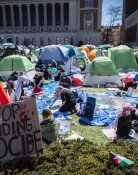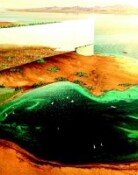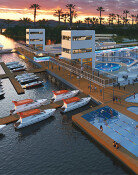World Stem Cell Bank to Open In Seoul Next Year
World Stem Cell Bank to Open In Seoul Next Year
Posted June. 08, 2005 06:40,
I expect that people will give interim applause late next year when Act One of a two-act play ends.
Hwang Woo-seok (Photo), a Seoul National University professor, candidly shared his story about difficulties and failures in the process of research, the possibilities of creating a cloned human, and ethical issues in the 134th Kwanhun Discussion held on June 7 at the international conference hall of the Korea Press Center in Taepyeongro, Jung-gu, Seoul.
He said, Research teams in the U.S. and U.K. recently proposed to jointly establish a World Stem Cell Bank in Korea, adding, I consulted with high-ranking government officials including Oh Myung, deputy prime minister and minister of Science and Technology, and it seems that we can establish the stem cell bank as early as this October.
He went on to say, Research teams in the U.S. and the U.K said that they would donate stem cells harvested in their countries to the stem cell bank, adding, In the 21st Century, Korea will be the leader in curing incurable diseases by using stem cells.
Professor Hwang attracted some 100 correspondents from home and abroad with his unique literary metaphors and eloquence throughout the two-hour discussion organized by the Kwanhun Club on June 7.
Peoples interest in Hwangs team is mainly focused on when stem cells could be used in treating patients.
With regard to that, Hwang said, Act One of the two-act play will end late next year, without elaborating on the content of Act One and when stem cell technology could be used in practice.
It is first time ever that a scientist had been invited to the Kwanhun Discussion, an event of the Kwanhun Club which was established in 1957 by Korean media professionals. The event involves invitations to prominent figures in political and business circles for discussions.
-Please explain when stem cells that your team harvested will be used in practice, by likening the research to a marathon race.
Hwang : This is different from a marathon broadcast. I cant be specific because that could unintentionally lead patients suffering from incurable diseases to have a false hope or leak important information to competitors in other countries. But I would liken the first harvest of stem cells last year to the 20km point in a marathon course. Likewise, research on differentiating stem cells into particular kinds of cells can be described as the 25km point, and the standardization of treatment processes using stem cells as the 30km point. We will reach the finish line when we have enough experiments and are able to clearly reveal the mechanisms behind them.
-Dont you have a bolder plan to form a joint front for international joint research?
Hwang : Coincidentally, experts from various areas had an in-depth discussion yesterday at Seoul National University Hospital. We are drawing up a strategy for international joint research, by thoroughly analyzing advantages, disadvantages, and know-how. We are planning to form a commission of experts. After the commission conducts a primary examination of the strategy, we will consult with the government.
-Religious circles, including the Catholic Church and Christians, recently declared that your research is in violation of life ethics. What do you make of that?
Hwang : In short, human cloning is nonsense. It is not only unethical, but also technologically impossible. We will not have an opportunity to meet a cloned human at least in a century from now. I respect diverse opinions in religious and ethical circles. It is fair to say that all science technologies are a double-edged sword. Biotechnology without ethical criticism is like a car without brakes or a street without traffic lights. I will be more careful, accepting not only lessons from the past, but also valuable lessons from the present.
-The Korean Bioethics Association proposed an open discussion May of last year. Why didnt you agree to have one?
Hwang : Its not that I didnt have such a discussion because I was afraid. I thought it is right to concentrate on research as a scientist, rather than participate in a social debate. I can say that our research team has a clean conscience before the public.
-Many people say that your work deserves a Nobel Prize.
Hwang : A Nobel Prize is not an end in itself. It would be valuable to me, if I would be remembered as a true scientist in history. But I want to tell you a story. Before I released the first results of stem cell research February of last year, President Roh Moo-hyun and the First Lady visited my research lab. At that time, the research outcome was top secret and no one knew about it. After listening to explanations of my research, President Roh told me, Please give me your opinion on how to support your team. I answered, Please support other teams. My research is very much like a long distance race that might not produce tangible results during your tenure. However, the president replied that he would be most happy if he could be remembered as a president who understood and began assisting science 20 or 30 years later. I just felt grateful for such support. I believe a Nobel Prize is for our younger scholars.
-I heard that you got so frustrated that you even felt the urge to commit suicide.
Hwang : In 2003, a power failure killed most of the cloned embryonic stem cells that I harvested through much difficulty. Only two colonies survived and I was devastated. I called Ahn Kyu-ri, professor of the SNU medical school, in the middle of the night and said, Please reserve a mortuary for me. I wouldnt want to live any longer if the remaining two die next morning. Fortunately, the survivor stem cells began to thrive the next day.
-Dont you think too much emphasis on security will lead to the nationalism of scientific research?
Hwang : There are no borders in science. However, a scientist needs his homeland. Science is a train of hopes and dreams that runs toward the welfare of mankind. I emphasize security because I want mankind to feel grateful for science in the name of Korea. It would be very rewarding if I could distribute stem cells made in Korea to mankind.
wolfkim@donga.com
Headline News
- N. Korea launches cyberattacks on S. Korea's defense companies
- Major university hospital professors consider a day off each week
- Italy suffers from fiscal deficits from ‘Super Bonus’ scheme
- Inter Milan secures 20th Serie A title, surpassing AC Milan
- Ruling and opposition prioritize spending amid tax revenue shortfalls







